- Home
- Peter Carey
Oscar and Lucinda bw-1988 Page 20
Oscar and Lucinda bw-1988 Read online
Page 20
45
Hymns
On the following Tuesday, Wardley-Fish happened to be in Martindale's bookshop. His fiancée had a fondness for the romantic novels of Mrs Plumber, and it was whilst she was enquiring after the most recent (in a voice that seemed, in that environment, too loud and confident) that he came across a copy of the elder Hopkins's Hennacombe Rambles. And here, with his umbrella hooked over his arm, he found a younger Oscar described as "the little botanist in skirts." This made him smile, of course. But for the rest of it, the smile became less certain and soon completely disappeared. It was as if he had netted Oscar in his home pond and could see 162
Hymns
him properly for the first time. And although he had visited the bare, wooden-floored cottage in Hennacombe and, indeed, listened at length to the elder Hopkins (who was immune, it seemed, to the freezing wind blowing through the open window) as the old man spoke of his wish that
"Christ's Kingdom should come in our lifetime," he now realized reading the book-that the pond was neither as he had seen it nor as Oscar had described it.
Wardley-Fish had an impression of a killjoy, love-nothing, a man you could not send a birthday present to in case he smelt the racetrack on it, a man who would snatch a little Christmas pudding from a young boy's mouth. But where he might have expected to find a stern and lifedenying spirit, he found such a trembling and tender appreciation of hedgerow, moss, robin, and the tiniest of sea creatures that even Wardley-Fish (it was he who thought the "even") was impressed and moved. Leaning against the counter at Martindale's with all the heavy physical awkwardness of a fellow waiting for his wife at the milliner's, he read this passage: "the pretty green Ploycera ocellata was numerous; but the most abundant, and at the same time most lovely species was the exquisite Eolis coronata, with tentacles surrounded by membranous coronets, and with crowded clusters of papillae, of crimson and blue that reflect the most gemlike radiance."
Now Wardley-Fish thought himself a man's man, steeped in brandy and good cigars, and ifexpediently-he had renounced the racecourse, he had no intention of abandoning the hunt, which he still rode to at Amersham whenever it was possible. Further, he imagined himself stupid. He had been told so long enough, and had this not been his father's opinion also, he would never have been pushed into a life as a clergyman. His early wish had been to study law, but he was told he had not the brain for it. He had not questioned this assessment and had therefore decided, whilst still at Oriel, that he could only hope to advance himself through connections, the most effective of which would be made through marriage.
He claimed to have no ear for poetry or music and yet he was moved-it nearly winded him-by the elder Hopkins's prose. Where he had expected hellnre and mustard poultice, he found maidenhair and a ribbon of spawn. "I found the young were perfectly formed, each enclosed by a globular egg, perfectly transparent and colourless."
To be able to feel these things, to celebrate God's work in such a lovely hymn, Wardley-Fish would have given everything and anything. He felt, in these simple, naturalist's descriptions, what he had never felt-what he should have felt-in the psalm beginning "I will extol 163
Oscar and Lucinda thee, my Cod, ^,
He stood at tK Kin8; and J wil1 bless Thy name for ever and ever." one would expet)C°unter' his head bowed, with that moist-eyed look returning to di^, f° ** Produced by a sentimental story. His fiancee, the saucy-eyed JVer both the changed mood and the parcel which the one had caUs'stant was wraPPingfor him, saw immediately that disposed towar^ the other' and was therefore not sympathetically liked him best», he book-She knew him as bright and jolly. She They found a ^ red Jacket fifteen hands high, ton. Riding throu!nsom outside the shop and ordered it to Kensinggreen, he contin^ Hyde Park' with a11 the deep black trees shooting his secret visit w% to think/ as he had thought, continually, since a room with only the coa1' of his friend who had jailed himself in of a terrifying vo> birdless sky for company and only the prospect
Once when he failed to look forward to.
Harrow, he had iv *s voun8' so y°ung he was not yet a boarder at a single blue starry dled with a stamP in his father's vast collection, so reverent almost With a Picture of a swan. He had been so careful, damaged. His fath^j.and yet' somehow, the perforations had been ing which made hJ' °f course' had noticed, and it was not the birchafterwards, but that? blubber into his nanny's white starched bosom caused harm, and t?e had intended only admiration, and instead had It was his charaq is harm was irreversible.
and so it would be ^.to carry the burden of his mistakes with him, not clear his mind,^Uh Oscar'
He could not put it down. He could
The carriage lurcj^ lt-Wardley-Fish, Jiearihed °n to the brid8e across the Serpentine and her and knew he diq 8 his fiancee exclaim bad-temperedly, looked at gusting to him. He f^.not like her-Her Httle plump wrists seemed disso by the powder oh choked' claustrophobic, was made particularly He wished he had u her dimPled cheek.
He had put the idea j ne out to Africa-He had thought of it for a while, ing to Africa togeth^to the Odd Bod's head-They had talked of goGardens-but there, r~this was well before the day at Cremorne now he knew he sho *d been the Problem of the water phobia. But tion that had made V^ have 8one to Africa anyway and the ambicontemptible. him court the da" ghter of a bishop seemed
He knew she would
he asked if he might j,110'like the.elder H «pkins's book, and yet when but rather in the hop Cad her a little' he d>d not do it provocatively, "Melody,"hesaid, '-^ that he might be wrong. must share my secret with you." They had not
164
Hymns
spoken since they left the West End and, as this silence was unusual, he knew she would be uneasy. He did not normally read at all, and he knew his purchase of a book would seem strange. Still, he pulled the string on the green parcel, smiling queerly in her direction.
"We are almost there, dearest," she said, but took the paper and string from him and began to tidy it. Wardley-Fish did not see the reproof intended.
"A little only," he said. "Here. It is written by the Odd Bod's pater and not in the least what one would expect."
She nodded, severely, she hoped.
Wardley-Fish opened the book, not at the beginning, but at random. " The body is about one and a half inches thick.' " he said (this was not quite the sort of thing he sought) " 'and the same in height, of a purplish brown hue marked with longitudinal bands of a dull lilac, each band margined with a darker colour.' "
Melody Clutterbuck looked at her fiancé, perplexed. They passed a troop of guardsmen on horseback, a sight she normally loved. She did not even notice. She opened her mouth to speak, to object to the unsavoury scent-there was no other way to think of it-of this writing. It certainly did not seem appropriate for ladies. But her fiancé was ahead of her. He was already galloping on in search of better evidence. A paragraph here. A sentence there.
"You see, you see," he exclaimed, his eyes glistening wet. She had only seen him become this excited about horses. "The old boy is a marvel. The old boy is alarming. It is the 'Yea!' Melody, isn't it? Your father's 'Yea!' Mr Carlyle's 'Eternal Yea!' The one your pater speaks of." "Ian, please!" "From this," he waved the book with great emotion, "to a room with no hre."
"Dearest, you make no sense."
" Within a day or two after this, the other two of the same species lay their spawn.' No, no dearest. It is botany, or zoology. The old fellow is a fearsome Evangelical so we need not worry ourselves about propriety."
But talk as he might, he knew he had gone too far. He surrendered 'he book when she held out her left hand for it and he watched it join its partner-she was, in spite of her firm chin, very agitated-as the Pair of them, left and right, attempted to collaborate in rewrapping tl» e parcel. I am frightened of her, he thought, and it is far too young to know
such a thing.
165
Oscar and Lucinda
It was the Hon. Mary Braden-Loch's day At Home. The young c
lergyman performed expertly. Melody Qurterbuck was pleased to have him much admired and had soon forgiven him his outburst in the cab. She was alarmed therefore to notice, in a break in the conversation, the dead quality of his lovely eyes. She could not guess that they held the indefinite sky of a window three storeys above the streets of Netting Hill. ^?
It was Mr Paxton-the same Mr Paxton who designed the Crystal Palace-who advised Lucinda Leplastrier to return to Sydney on the Leviathan. He spoke as an engineer, he said, and there is no doubt she would see nothing like it "so long as sanity is the general condition in my profession."
Lucinda expressed doubt that she should entrust her life to a vessel so described. He made it sound as if the ship were quite unsound.
"Its ability to float at sea is inversely proportional to the likelihood of it floating on the season of commerce. Go, " he said, "it is as safe as an elephant. It will be a great experience, aye, and a rare one, too, because she will be bankrupt two years from now, and Mr Legare can go back to building bridges which is more his line of work."
She bought her ticket with her customary confusion about the price. It was fifty-five pounds for second class. It was too much money. It was seventy pounds for first class. She could afford it. She bought a first-class ticket, but in all her to-ing and fro-ing about the rights and wrongs of this, she never imagined that the largest ship ever built would be so empty. London had been lonely enough. This was worse. And it was because of this, because of the grand and supercilious spaces, that she had come down on to the wharf and she was, the minute her feet were on the ground, much happier.
166
In a Trice
It was like descending from a town hall to a market place-suddenly there was life all around hersteel rails along the wharf and cranes rolling to and fro, donkey engines thumping, white blossoms of steam, and even the rain, although it wet her boots, did not depress her. She was pleased to be down here, amongst practical people. There were practical smells-coal, coke, anthracite, mineral oil. It was the mineral oil that made her think about her glassworks with which, in her absence, she had developed a closer and more affectionate relationship. She forgot the anxieties and tensions her ownership produced and felt, '} now, on Southampton wharf, sympathetically drawn to the man who; smelt of mineral oil-an engineer, she guessed, a frecklefaced Scot i with a clenched-up face who would never be welcome in Marian Evans's drawing room. Her glassworks smelt like this. All glassworks did. At the glassworks she visited in Trent, in London itself, and even in Nottingham where they were making sheet glass for Mr Paxton, there was the same smell, the smell of her own works on Darling Harbour. The pear wood they used to turn the foot of a vase would be soaked, not just in water, but in mineral oil, and she was suddenly made impatient to return-as impatient as she had been to leave-to the aroma of burnt pear wood, mineral oil, and the acrid chemical smells of sulphates and chromâtes oxidizing to green and yellow.
She was twenty-two years old and fashionably dressed in grey moiré. Her back was curved; her backside, as was the fashion, pronounced but not to the degree suggested by George Eliot in a sharp letter written at that time. The pamphleteer's daughter, according to the famous novelist, could have sat a tea tray on the ledge of her backside, but George Eliot was fifty-eight years old and bad tempered with kidney stones and she had misunderstood the girl completely. She is such a "little" thing, it would appear that all conversation has been squeezed out of her. She sits with her hands pressed in her lap, totally silent, but with no consciousness of her social inadequacy and it is difficult, after the second hour, to maintain one's natural sympathy for her. George [Lewes] was kind and took her to the British Museum and then to tea where she seems to have attempted to seduce him into a game of chance. Apart from this outburst she seems to have said little, and it is so difficult, no matter what one's intentions, to hold a conversation with someone who will not talk.
Lucinda had expected her mother's friend to share her mother's enthusiasms. But while George Eliot had encouraged Elizabeth's essays and pamphlets, she had never shared "Elizabeth's fanatacism" for
167
Oscar and Lucinda
factories. And while she was interested to learn that the orphan had actually purchased a factory, she did not wish to discuss the manufacture of glass. If Lucinda had employed female glass blowers, perhaps it would have been different, but her single attempt in that direction had been a failure. George Eliot was not interested, and she had work to do.
Lucinda thought George Eliot was a snob. She preferred Mr Paxton who laughed at her outright but who had, just the same, explained his new project, presented her with a blueprint of the broad schemata, and written her letters of introduction to the glassworks he dealt with. To be patronized by Mr Paxton was an altogether more pleasant experience than being disapproved of by her mother's famous friend.
Lucinda had come to London thinking of it as "Home." It was soon clear that this great sooty machine was not home at all. She had left Sydney with thoughts of marriage and children. She had left-^although it did not make her comfortable to remember this-in a temper with Dennis Hasset who, whilst remaining her close friend and confidante, obviously did not think her a suitable candidate for marriage. She had left him to stew in the juices of his own regret. She did not doubt she would have proposals in London, if only because of her wealth. She had steeled herself to fend off undesirables. Nothing like this had happened, although the stern Mr Paxton had behaved, twice, in an ungentlemanly way.
She stepped back to allow the steam crane to pass along its rails and, looking up to see what it might be carrying, saw a bellowing Poll Hereford with a canvas sling under its middle. The crane stopped and began to lower its burden on to the top of that mighty riveted cliff wall which was Leviathan.
The wharf resembled a sale yard and reminded the woman with the small bright eyes of the days she had gone into Parramatta with her father to buy a pig or sell the vealers. The air was redolent with fear and wet fur. The beasts were scouring, and thinking of this, she resolved to stand beneath no more airborne beasts.
She walked past the corralled animals, and did not mind the stares of the oilskin-wrapped shepherds who could not imagine why a woman, one of her class, would walk along a busy wharf in the rain. She was accustomed to this sort of stare and while she felt the implicit threat in it-the voodoo of a group of men-she was now a woman who employed such men, and her old fears in the face of their insulting confidence were allayed by the knowledge of her economic strength. It was wrong that she had this strength but she was, thank 168
In a Trice
God, pleased to have it. She did not make them lower their eyes, but she already had the power to do so. This power was primed by money, but it was not fuelled by it. And it was this, this turbulent, often angry sense of her own power, that was most responsible for her being lonely in London. Even George Eliot, no matter what her fiction might suggest, was used to young ladies who lowered their eyes in deference to her own. Lucinda did not do so. The two women locked eyes and George Eliot mentions (in the letter already quoted from) "a quite peculiar tendency to stare." It may well have been this, not her bitsand-pieces accent, her interest in trade, her lack of conversational skills, her sometimes blunt opinions or her unladylike way of blowing her noselike a walrus, said George Eliot-that made her seem so alien. And when she did, at last, lower her eyes, her lids were heavy and sensuous. They produced an effect which was ungenerously described as "sly."
She walked past the long-nosed Derby hogs, all pushed into each other like pieces in a puzzle, and found a great collection of wet and rusty cages and two men arguing over one of them, A hansom clipped past them, bursting with clergymen, or so it seemed. She noticed the unusual red hair of one of them, but only in passing, being more taken by the argument which concerned one cage only, it being, apparently through error, filled with wet and shivering rabbits.
"Crikey Moses!" said the short one. He had an eager sort of face with heavy sand
y eyebrows pressing down upon his blinking eyes. "The blessed colony is half eaten out by rabbits. Why would I want more?" He screwed up his face and sent his voice up into falsetto.
"Don't ask me, guv. It's all writ here."
"Ill take the rest, but not the rabbits."
"Sorry, guv, t'ain' either or. It's all or bleeding nothing." Lucinda walked amongst the cages: rabbits, pigeons, pheasants, all addressed to a body known as the Acclimatization Society of New South Wales. There were also deer, half a dozen does and three bucks, all the males in separate cages, and one of them already bleeding badly around the head. And lastly, there were llamas, standing still and wet, each one in a separate cage, all marked with stern signs forbidding any contact. Lucinda tried to pat a doe, but it pulled its head away sharply and, when she persisted, tried to bite her.
She turned to walk back to the first-class gangway. The rain was beginning to ease back to its more usual drizzle. An officer, done up in braid like an Italian, saluted her. There were fifty-five days to Sydney. Fifty-five days before she would know if Dennis Hasset had-she bit 169
Oscar and Lucinda
her lower lip and scrunched up her eyes-married Harriet Borrodaile or Elizabeth Palmer. His letters had mentioned "the most appalling dances" but she did not trust the description. Dear God, let him still be a bachelor, not that I might marry him, but that he may be my friend. Dear God, please leave me someone with whom I can talk.
The rain started again, heavily, and the gangway ahead would not clear. She lifted her umbrella to see properly, peering up from the fourth step. It would appear that there were problems with an invalid. She recognized the red-haired clergyman as the one who had arrived in a hansom, or, rather, recognized the hair. It was he who was the invalid. She thought it strange they should carry a man backwards up a gangplank. But then, as she watched, she saw they were no longer going up, but coming down. And this was how she first saw Oscar, although there was not a lot to see because he had his hands pressed to his face.

 True History of the Kelly Gang
True History of the Kelly Gang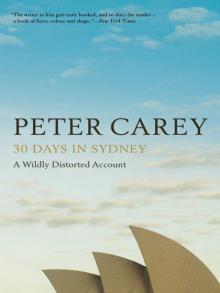 30 Days in Sydney: A Wildly Distorted Account
30 Days in Sydney: A Wildly Distorted Account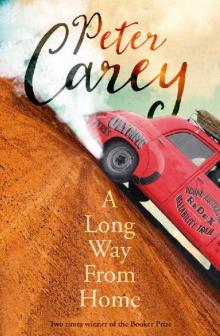 A Long Way From Home
A Long Way From Home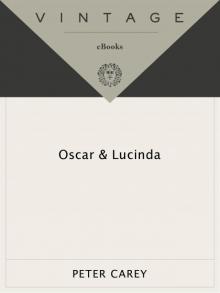 Oscar and Lucinda
Oscar and Lucinda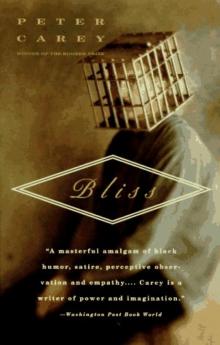 Bliss
Bliss Wrong About Japan
Wrong About Japan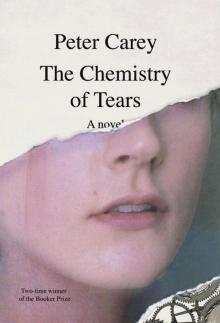 The Chemistry of Tears
The Chemistry of Tears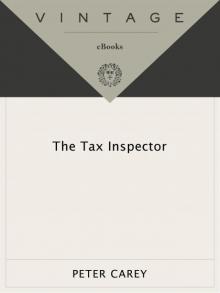 The Tax Inspector
The Tax Inspector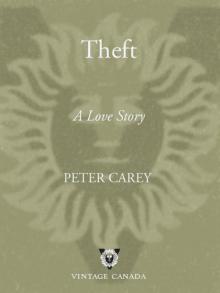 Theft: A Love Story
Theft: A Love Story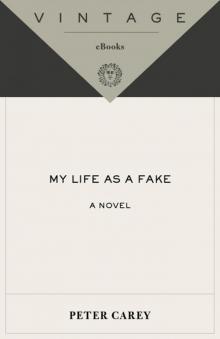 My Life as a Fake
My Life as a Fake Collected Stories
Collected Stories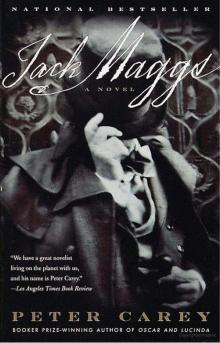 Jack Maggs
Jack Maggs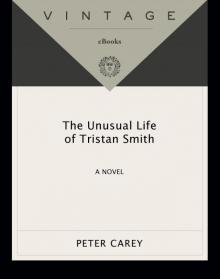 The Unusual Life of Tristan Smith
The Unusual Life of Tristan Smith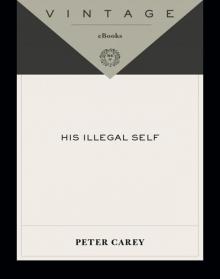 His Illegal Self His Illegal Self His Illegal Self
His Illegal Self His Illegal Self His Illegal Self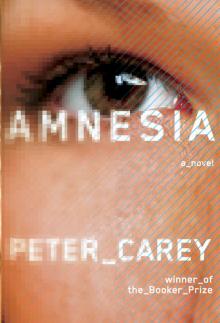 Amnesia: A Novel
Amnesia: A Novel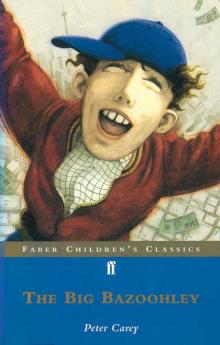 The Big Bazoohley
The Big Bazoohley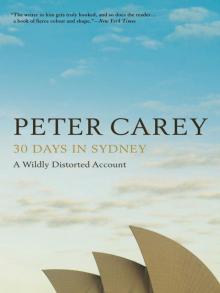 30 Days in Sydney
30 Days in Sydney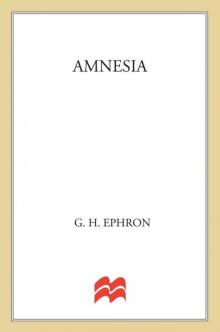 Amnesia
Amnesia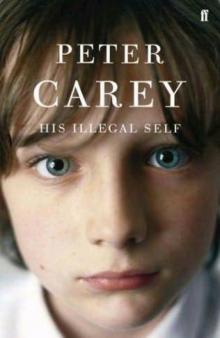 His Illegal Self
His Illegal Self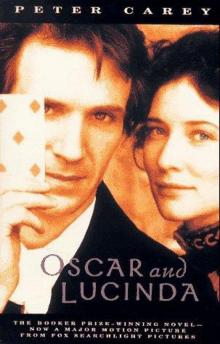 Oscar and Lucinda bw-1988
Oscar and Lucinda bw-1988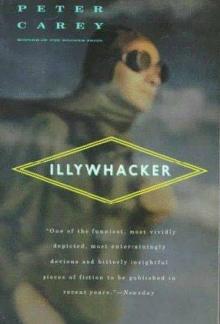 Illywhacker
Illywhacker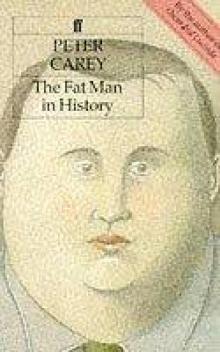 The Fat Man in History aka Exotic Pleasures
The Fat Man in History aka Exotic Pleasures